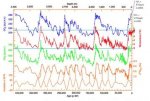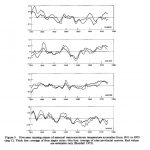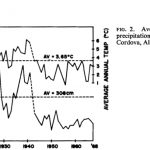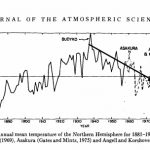A consensus that they were unable to accurately predict future climate. OK. Not sure how that helps your point, but OK.
They know a great deal about the variables. They know a great deal of the uncertainty. In real science there is always uncertainty. It is the hallmark of real, valid science. Uncertainty will never be 0.
When I make a statistical model to explain, say, a particular coating formulation's response to added components I find that I can explain most of the results with a properly fitted model. Sure there may be a few factors that are not included because I didn't know about them, or maybe I failed to use a quadratic term in my fit. But I can still explain the majority of the variance and that is how I know I'm closer to the answer.
Sounds like you might just be grasping at questions to keep "doubt" alive. Fair enough. Any references in which gravity is considered somehow a feedback or forcing on climate change? I've never heard about that, but I've only been reading climate change stuff off and on for a couple decades. I could have missed it.
If we "solve" the "mystery" of gravity in regards to climate change we will STILL have to worry about the effect of neutrinos. Or how about up-quarks? Have we factored in the up-quarks? We can't know if AGW is real until we've exhausted literally all items in the universe as explanatory variables and we have reduced the residuals down to absolute 0.
The consensus is meaningless, the data is all that counts!
We have measured some versions of an energy imbalance, that could be related to added CO2.
http://asl.umbc.edu/pub/chepplew/journals/nature14240_v519_Feldman_CO2.pdf
Feldman, found a .22W/m2 increase in downwelling longwave radiation, as CO2 increased from 369 ppm to 392 ppm.
He said that,
This quantity is distinct from stratosphere-adjusted radiative forcing at the tropopause, but both are fundamental measures of energy
imbalance caused by well-mixed greenhouse gases15.The former is less than,
but proportional to, the latter owing to tropospheric adjustments of sensible and latent heat
I question the much lower number, considering that a even a energy move from sensible to latent heat,
would be reflected in the IR emissions of the gasses/vapor.
If he is looking up, what energy he does not see downwelling, is going the other direction.
The is a chance that his 5 to 20 um window, missed something above or below, but we have to consider how far off his measurement
was from the predicted CO2 forcing.
.22 W/m2/ ln(392/369)= 3.64, so 3.64 X ln(2)=2.52 W/m2 for a doubling of CO2.
If the energy is not showing up in a 5 to 20 um window coming down, it must be going up!
Another thing Feldman noted, was,
However, despite widespread scientific discussion and modelling of the climate impacts of well-mixed greenhouse gases,
there is little direct observational evidence of the radiative impact of increasing atmospheric CO2.
The think, 28 years after Hansen's talk to the Senate, no one actually bothered to measure the predicted changes!
To me it is the alarmist who claim there is evidence, but when asked to cite the empirical data, are grasping at modeled straws!




